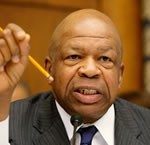
Officials from for-profit colleges, with some of the largest online programs in the U.S., painted the industry as a fiscally sound choice for students after Rep. Elijah Cummings, D-Md., called for an investigation into “lavish” CEO pay at for-profit schools.
Cummings said Dec. 13 that the House Committee on Oversight and Government Reform would investigate executive pay at 13 for-profit programs, some with high student loan default rates and a checkered history of false claims used to dupe students into signing up for massive loans.
Committee members will decide whether for-profit schools, which depend on federally guaranteed student loans for the vast majority of their profits, were awarding executives fairly while student dropout rates and loan defaults rose at many prominent for-profit colleges.
Read more about for-profit colleges in higher education…
For-profit college default rate spikes; industry hits back
Plan to outsource online classes to for-profit schools meets opposition
“The American taxpayers fund these schools through billions of dollars in tuition assistance, but there is little evidence that lavish executive pay is linked to the well-being of the students they are supposed to educate,” Cummings said in a statement. “Congress has a responsibility to ensure that taxpayer funds are being used first and foremost for the benefit of students, not to line the pockets of corporate executives.”
Brian Moran, interim CEO and president of the Association of Private Sector Colleges and Universities (APSCU), led the criticism of Cummings and other lawmakers who pushed for the investigation.
For-profit colleges, he said, have provided career training for students in a down economy while avoiding tuition and fee increases that have become commonplace at public universities and nonprofit colleges.
“This appears to be just more politics and unfortunately fails to acknowledge the important role private sector colleges and universities have in educating non-traditional students to compete for jobs in a very difficult economic environment,” Moran said. “Rather than singling out one sector, we hope that Representative Cummings evaluates all areas of higher education so that the true beneficiary is the student.”
National statistics have shown students at for-profit colleges are less likely to graduate and more likely to default on their loans. Fifteen percent of for-profit college students have defaulted on their school loans. Overall, 8.8 percent of U.S. college students have defaulted on their loans.
The University of Phoenix has a loan default rate of 18.8 percent among students who began paying back their loans in 2009, up from 12.8 percent when compared to students who began repaying loans in 2008.
Among the 13 schools being investigated by the Congressional committee, Corinthian Colleges has the highest default rate, at 36 percent.
Twenty-five of the 100 highest-paid for-profit college CEOs received more in compensation last year than their companies paid in federal taxes, according to the Institute for Policy Studies.
A recent case of a for-profit college CEO who resigned and was given a $5 million compensation package after his school was accused of exaggerating job placement rates might undercut the industry’s position against the Congressional investigation.
Gary McCullough, former head of Illinois-based Career Education Corp., was awarded the package after he stepped down in November, shortly after inflated job placement numbers caught the attention of Accrediting Council for Independent Colleges and Schools, according to a report from California Watch, an organization that tracks the for-profit industry.
Like most for-profit schools, Career Education gets most of its funding – about 80 percent – from taxpayer money.
Students at Career Education’s California Culinary Academy in San Francisco said they were told by recruiters that 97 percent of students there secured jobs in the culinary field, according to California Watch.
Career Education agreed to pay $40 million in a class action lawsuit that resulted from the false job placement claims.
- Research: Social media has negative impact on academic performance - April 2, 2020
- Number 1: Social media has negative impact on academic performance - December 31, 2014
- 6 reasons campus networks must change - September 30, 2014
Comments are closed.